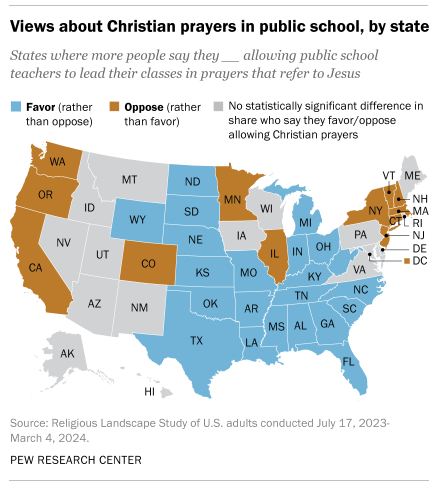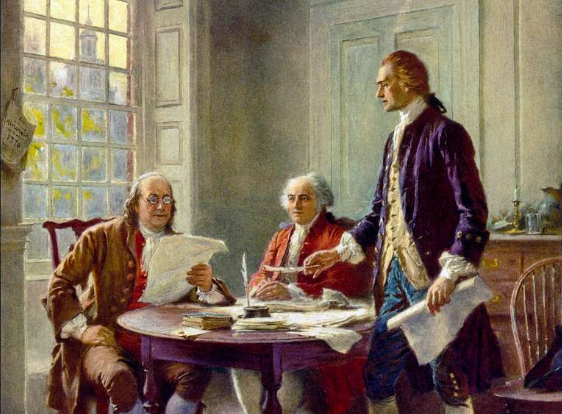One of the childhood stories in my father’s arsenal is set at lunchtime in his local public school. Although he went home for lunch, he often heard his teacher leading the classroom in a group rendition of “Come Lord Jesus, be our guest,” as he gathered his things before walking across the street. A few short years later, the winds changed, and he was bawled out in class for disagreeing with a lesson due to his Christian beliefs.
His experience prompts an important question: Should Christian prayers take place in public schools?
American answers to that question all depend upon where one lives, a recent Pew Research report found. Many states – particularly in the South and middle portions of the country – say yes. But more states either oppose or are evenly divided on the issue than those which favor it.

The fact that so many states favor Christian prayers in public schools may come as a surprise to those who have long been told that the American education system is a bastion of secularism, the place where that proverbial “wall of separation” between church and state reigns supreme.
Such surprise may be lessened, however, if we look at what the American founders anticipated being taught in the nation’s schools. Here are four of those interesting recommendations – religious or otherwise.
1) Christianity
Benjamin Rush, a signer of both the Declaration and the Constitution, recommended teaching religion, particularly Christianity. “[T]he only foundation for a useful education in a republic is to be laid in Religion,” he wrote, noting that the virtue religion teaches is the seed of liberty necessary for a republic to survive.
Rush said that he would rather see “the opinions of Confucius or Mahomed inculcated upon our youth” than see them raised in the void of secularism like we see in today’s classrooms. “But the religion I mean to recommend in this place is that of the New Testament.”
Why? “[A]ll its doctrines and precepts are calculated to promote the happiness of society, and the safety and well being of civil government,” Rush wrote, expounding several reasons in favor of Christianity’s instruction in the classroom:
A Christian, I say again, cannot fail of being a republican, for every precept of the Gospel inculcates those degrees of humility, self-denial, and brotherly kindness, which are directly opposed to the pride of monarchy and the pageantry of a court. A Christian cannot fail of being useful to the republic, for his religion teacheth him, that no man ‘liveth to himself.’ And lastly, a Christian cannot fail of being wholly inoffensive, for his religion teacheth him, in all things to do to others what he would wish, in like circumstances, they should do to him.
2) Character
The esteemed Benjamin Franklin noted the importance of character training in American education, particularly through an examination of history, observing how those who have gone before advanced or declined because of their character or lack thereof. He encourages instruction in “the Advantages of Temperance, Order, Frugality, Industry, Perseverance,” as well as “the Beauty and Usefulness of Virtue of all Kinds, Publick Spirit, Fortitude, etc.”
In recent years, the government has endorsed classroom behavior policies that focus more on the color of a student’s skin rather than the content of his character. This has left many classrooms in disarray, with teachers physically injured thanks to student violence, while other students endure chaos, unable to learn much of anything. Perhaps reinstating Franklin’s curriculum of character would be a first step toward remedying many of these overwhelming issues.
3) Cultivation of Heroes
Although not a signer of the Declaration or Constitution, Noah Webster is often considered an American founder for his role in shaping the nation’s education system through his speller and dictionary. Contrary to popular wisdom today, which suggests that our American heroes should be vilified and erased from memory, Webster believed students should be taught to honor and imitate those who went before:
But every child in America should be acquainted with his own country. He should read books that furnish him with ideas that will be useful to him in life and practice. As soon as he opens his lips, he should rehearse the history of his own country; he should lisp the praise of liberty, and of those illustrious heroes and statesmen, who have wrought a revolution in her favor.
Such focus on American heroes, Webster implies, creates a love of country in students and helps them to understand it better – a fact which will help them to wisely join in its governance and guidance in future years.
4) Cursive
“All should be taught to write a fair Hand, and swift, as that is useful to All,” Benjamin Franklin wrote in his “Proposals Relating to the Education of Youth in Pensilvania.”
America ignored that advice when it threw cursive writing instruction out the window in 2010 thanks to Common Core standards. As a result, an entire generation of students cannot write legibly or swiftly, a fact which decreases their brain power to remember and retain information.
These four recommendations – broad and wide-ranging as they are – were accepted as givens by the American founders, necessities that should be a part of every American child’s education. Yet they’re almost non-existent in today’s public schools – the same schools that are in vast disarray. Perhaps that disarray might be quickly remedied if we began implementing the lessons those who established our nation thought so essential to its survival?
—
The republication of this article is made possible by The Fred & Rheta Skelton Center for Cultural Renewal.
Image Credit: Picryl
29 comments















29 Comments
Gabriella Savannah
July 18, 2025, 2:42 pmRussia Reinforces Grip on Ukraine Frontline as Trump Grants Putin a 50-Day Opportunity xenixnews.com
REPLYRepavotdilit@Gabriella Savannah
July 19, 2025, 1:43 amɪᴍ ᴍᴀᴋɪɴɢ ᴏᴠᴇʀ 𝟷𝟹ᴋ ʙᴜᴄᴋs ᴀ ᴍᴏɴᴛʜ ᴡᴏʀᴋɪɴɢ ᴘᴀʀᴛ ᴛɪᴍᴇ. ɪ ᴋᴇᴘᴛ ʜᴇᴀʀɪɴɢ ᴏᴛʜᴇʀ ᴘᴇᴏᴘʟᴇ ᴛᴇʟʟ ᴍᴇ ʜᴏᴡ ᴍᴜᴄʜ ᴍᴏɴᴇʏ ᴛʜᴇʏ ᴄᴀɴ ᴍᴀᴋᴇ ᴏɴʟɪɴᴇ sᴏ ɪ ᴅᴇᴄɪᴅᴇᴅ ᴛᴏ ʟᴏᴏᴋ ɪɴᴛᴏ ɪᴛ. ᴡᴇʟʟ, ɪᴛ ᴡᴀs ᴀʟʟ ᴛʀᴜᴇ ᴀɴᴅ ʜᴀs ᴛᴏᴛᴀʟʟʏ
ᴄʜᴀɴɢᴇᴅ ᴍʏ ʟɪғᴇ…..➤➤ http://www.get.money63.com
REPLYilliana@Repavotdilit
July 20, 2025, 1:35 pmEverybody can earn 220$/h + daily 1K… You can earn from 6000-12000 a month or even more if you work as a part time Work…It’s easy, just follow instructions on this page, read it carefully from start to finish… It’s a flexible job but a good eaning opportunity..go to this site home tab for more detail thank you…….
REPLY.
Reading This Article:———- https://www.join.work43.com/
JoelDarvall@Gabriella Savannah
July 19, 2025, 11:45 amEverybody can earn 220$/h + daily 1K… You can earn from 6000-12000 a month or even more if you work as a part time Work…It’s easy, just follow instructions on this page, read it carefully from start to finish… It’s a flexible job but a good eaning opportunity..go to this site home tab for more detail thank you…….
REPLY.
Reading This Article:———- http://Www.Cash43.Com
Rachel Hytten@Gabriella Savannah
July 19, 2025, 11:48 amMy roomate’s mom-in-regulation makes usd eighty one each hour at the laptop . She has been fired for eight months but remaining month her paycheck turned into usd 17367 just operating on the pc for a few hours…..
Reading This Article:—- https://Www.Payathome9.Com
REPLYLethaCReilly@Gabriella Savannah
July 22, 2025, 6:17 amI get paid more than $100 to $500 per hour for working online. I heard about this job 3 months ago and after joining this I have earned easily $20k from this without having online working skills . Simply give it a shot on the accompanying site…
REPLYHere is I started.…………>> https://Www.joinSalary.Com
Strasser@Gabriella Savannah
July 22, 2025, 7:56 amI get paid over $130 1 to 3 hours working from home with 2 kids at home. I never thought I'd be able to do it but my best friend earns over $27k a month doing this and she convinced me to try. The potential with this is endless.
REPLYHeress———–> http://www.best.work43.com
Lauren Gregory@Gabriella Savannah
August 6, 2025, 9:32 amWith joy in my heart and gratitude to God almighty i have come to tell the general public that Lord Gerald herbal medicine is the best remedy for Herpes and HIV/AIDS, I was a carrier of Herpes virus and I saw a testimony on how Lord Gerald cure Herpes, I decided to have a contact with him and asked him for help and he started the remedies for my health and prepare the herbal medicine for me which i use to cure myself. Thank God, now everything is fine, I’m cured by Lord Gerald herbal medicine, I’m very thankful to Lord Gerald and i will not stop publishing his name on the internet because of the good work he did for me, You can reach him on his email: [email protected] or
WhatsApp: +14242983869
LORD GERALD CAN AS WELL CURE THE FOLLOWING DISEASE:-
1. HIV/AIDS
2. HERPES
3. CANCER OF ALL KINDS
4. HSV
5. Hepatitis A,B,C
6. Diabetes
7. Parkinson’s disease
8. C.O.P.D
9.ALS
10. Coronary Artery Disease (Ischemic Heart Disease)
11. Alopecia
12.Bipolar disorder
13.Bedwetting
14.Carpal tunnel syndrome
15.Celiac disease
16.Ear Infections
17.Endometriosis
18.Epilepsy
19.Chlamydia
20.Syphilis
21.Gonorrhea
Natural remedy for curing HERPES and HIV. WhatsApp Lord Gerald on +14242983869
REPLYGabriella Savannah
July 18, 2025, 2:45 pmRussia Reinforces Grip on Ukraine Frontline as Trump Grants Putin a 50-Day Opportunity xenixnews.com
REPLYAminawajid
July 19, 2025, 3:10 amI get paid over $130 1 to 3 hours working from home with 2 kids at home. I never thought I'd be able to do it but my best friend earns over $27k a month doing this and she convinced me to try. The potential with this is endless.
REPLYHeress———–> http://www.now.jobs67.com
BrettSGass
July 19, 2025, 4:26 amI get paid more than $120 to $130 per hour for working online. I heard about this job 3 months ago and after joining this i have earned easily $15k from this without having online working skills.
This is what I do……. Www.Works6.Com
REPLYNoel Patricio
July 20, 2025, 3:36 amA Life-Changing Experience, Dr Kachi A Testimony of Gratitude
I would like to share an extraordinary experience that has transformed my life. I came across a remarkable testimony online forum about a powerful and renowned spell caster, Dr. Kachi. At the time, I was skeptical because I had never encountered anything related to magic or spell casting before. However, the story of Dr. Kachi's work resonated with me, and I decided to give it a chance. For years, my family and I struggled financially, and despite my best efforts, I never had luck winning the lottery. I loved playing, but winning seemed impossible. Everything changed when I connected with Dr. Kachi, who provided me with a winning lottery number through a powerful spell. In just 24 hours, I was able to play the lottery and won the Lotto 6/49 prize, a remarkable $68 million cash prize, on September 27th in the Gold Ball Draw. This incredible win has completely changed my life and the financial well-being of my entire family. After 10 years of trying unsuccessfully, I am now living my dream life. I am beyond grateful to Dr. Kachi for his assistance, Dr. Kachi has truly been a blessing to me and my loved ones. I encourage anyone who is interested to reach out to Dr. Kachi for guidance. his website https://drkachispellcaster.wixsite.com/my-site or email [email protected]. Also reach him text or call +1 (209) 893-8075.Thank you once again, Dr. Kachi, for making my dreams come true.
REPLY